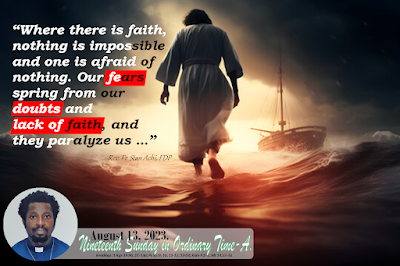CALLED TO FAITH, NOT TO FEAR.
August 13, 2023.
Nineteenth Sunday in Ordinary Time – A.
"It is a ghost," they said, and they cried out in
fear. At once Jesus spoke to them, "Take courage, it is I; do not be
afraid." Mt 14:26
An Ewe proverb says: “Who has shoes does not fear thorns.”
And a Sicilian proverb adds: “Who serves God, fears nothing.”
God is faithful to his promises and true to his words. We
must not doubt him. All he promises come true. All that it requires from us to
see him is faith; to not fear or doubt, but to believe. God’s presence and
apparitions could sometimes frighten us but we should never doubt for, he
forsakes or abandons no one who trusts in him.
The Catechism says, “God is truth. "The sum of your
word is truth; and every one of your righteous ordinances endures
forever." "And now, O Lord God, you are God, and your words are
true"; this is why God's promises always come true. God is Truth itself,
whose words cannot deceive. This is why one can abandon oneself in full trust
to the truth and faithfulness of his word in all things. The beginning of sin
and of man's fall was due to a lie of the tempter who induced doubt of God's
word, kindness and faithfulness.” CCC 215.
One thing we should learn in our faith in God is to overcome
the impossible. This is made possible only through firmness of belief. Where
there is faith, nothing is impossible and one is afraid of nothing. Our fears
spring from our doubts and lack of faith, and they paralyze us, making us
unable to move and see God's presence.
How does God manifest himself to us? And how and where do we
see him? These are the two beautiful questions that spring from today’s
liturgy.
In the first reading, we are given to meditate on the
singular experience of the Prophet Elijah, the Theophany of the Horeb. Queen
Jezebel threatens to kill Elijah. He so fled, fearfully, to save his life and
traveled forty days in despair and desolation. However, with the help of an
angel of God, the Prophet travels to Horeb, where he encountered God. And that
is our today's extract from the Book of Kings. We read that the Lord asked the
Prophet to go out so that he may encounter him. Elijah, with firm trust in the
Lord, did so. But then came signs: A strong heavy wind, an earthquake, and a fire
but in none of these magnificent signs was the Lord found. Because God's
presence is not meant to frighten. God appears to comfort us in our fears and
to raise our hope and faith. So, he will never use fearful events to appear to
us. We read that he revealed himself to the Prophet in a tiny whispering sound.
There, Elijah felt God's presence. "He covered his face with his cloak and
went out and stood at the entrance of the cave."
Also today, the Lord God is still manifesting himself. He
continually appears to us. We can only see him not through sight but through
faith. For, genuine faith is the key to all encounters. Where there is faith,
we said ahead, there is no fear.
We read in the Gospel that, after the multiplication of
bread to feed the huge crowd, the Lord Jesus asked his disciples to cross the
Sea to the other side ahead of him. The disciples were on a journey of faith.
Not only did they not understand the multiplication of bread, but they did not
know too well Jesus. With all their doubts, they were crossing the sea. And
then comes the tempest to increase their fear. They were thus on a journey with
fear, doubts, and uncertainties... More frightening is Jesus’ walking toward
them on the Sea.
As a normal human reaction, fear increased in them. “Fear is
a natural and biological condition that we all experience,” say the
Psychologists. In life, when we fear, when we are hopeless; when our faith
decreases, and as a consequence of our fears, we sink. So, too, it went with
Peter when the Lord answered his request to walk toward him. We read that
"Peter got out of the boat and started walking towards Jesus across the
water, but as soon as he felt the force of the wind, he took fright and began
to sink. ‘Lord! Save me!’ he cried." The Lord stretched his hand, rescued
him, and accused his littleness of faith.
One nice thing, however, that we learn from Peter is that he
did not hesitate to call to the Lord. In the hours of tribulations, trials, and
fear, we must not call or run to other than the Lord. For, he alone can rescue
and save us.
Here goes the story of an old catechist who was considered
very remarkable in his faith, but in truth, he was a hidden worshipper of
idols. One day, while crossing the river for the liturgy in a remote chapel
with the priest, sacristan and others, their canoe hit a tree and began to
sink. Instinctively, the catechist shouted: "Diby Demie!" that is,
"Diby save me!" Diby was the name of a famous fetish in this region.
The people accompanying him, including the priest, were all astonished, with
the catechist calling Diby for help instead of calling Jesus. As if to say, in
troubled times, everyone runs towards what they really believe in.





Comments
Post a Comment